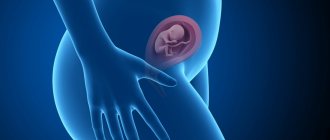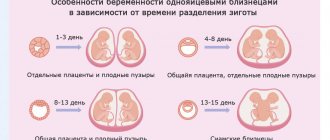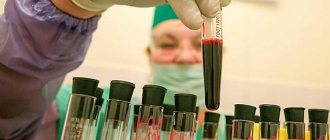The fetus at the 4th week of pregnancy reaches a size of 4 mm. The head still bears little resemblance to a human head, but ears and eyes are emerging. At the 4th week of pregnancy, with a multiple magnification of the photo, you can see the tubercles of the arms and legs, the elbow and knee bends, and the rudiments of the fingers are clearly visible. The gastrointestinal tract and lungs gradually develop. Blood vessels grow in the umbilical cord, thanks to which the embryo receives oxygen and nutrition from the mother’s blood.
But the most important thing in the fourth week of pregnancy is the transformation of the heart tube into a heart that begins to contract! It is still primitive, it has only 2 chambers (the ventricle and the atrium, the latter will be divided into right and left in a few days). The final formation of the heart will be completed by the 8th week. During this entire period, it is important to protect yourself from illness and stress in order to prevent heart defects from occurring in your child.
4 weeks of pregnancy is an important stage in the development of the fetus. It is during this time that a significant percentage of spontaneous abortions occur.
Possible reasons:
• formation of a hematoma at the site of blastocyst implantation at the 4th obstetric (2nd embryonic) week, and gradual rejection of the fetus;
• genetic defect (chromosomal abnormality or mutation at the time of conception), when further development of the embryo is impossible;
• low quality of the fertilized egg;
• Rh conflict (different Rh factor in the fetus and mother);
• emotional stress, physical exhaustion;
• hidden infectious processes in a woman’s body;
• hormonal imbalance.
The main warning signs and symptoms of a threatened miscarriage are severe nagging pain in the lumbar region or cutting pain in the lower abdomen, red or brown spotting, and bleeding. In most cases, the cessation of fetal development is associated with its internal pathology. If spontaneous abortion recurs, you should seriously examine your health (yours and your partner’s) in order to find a possible cause and eliminate it.
Interesting Facts
| Options | Indications |
| Time from conception | 2 weeks |
| Period by month | 4 weeks |
| What month | Goes first |
| Dimensions and weight of the fetus | 0.36–1 mm, 0.5 g |
| Uterus dimensions | Normal |
| Pregnant weight | Ordinary |
Your baby is the size of
poppy seed
0.36-1mm Size
0.5 g Weight
The fourth week of pregnancy is one tenth of your journey to motherhood. About 10 days ago, fertilization occurred, the embryo reached the uterus and attached to its wall. How is your body changing and what should you pay attention to during this period?
Note that we are talking about the obstetric calculation method. The picture is completely different at 4 weeks of pregnancy from conception. You can find out what happens to the fetus and the woman at this stage from the article “6th week of gestation.” The embryonic method is conventional and is not used by gynecologists, so our calendar is based on the obstetric counting system.
Fetal development in the fourth obstetric week
- The body of the embryo consists of ectoderm, mesoderm and endoderm. These are the so-called germ layers. From the ectoderm, hair and nails, teeth, skin, and the nervous system are formed. Skeletal muscles, blood vessels, blood, gonads and internal organs are formed thanks to the mesoderm. The inner germ layer is responsible for the formation of the digestive tract, lungs, pancreas and liver.
- The child also develops external organs that create conditions for his growth and development. One of them is the chorion, which will later turn into the placenta. It is she who will provide the fetus with all the necessary nutrients. The amnion is modified into the amniotic sac, which is filled with amniotic fluid and is responsible for protecting the small organism throughout pregnancy. And the yolk sac will be responsible for hematopoiesis during the first 7-8 weeks of pregnancy.
Feelings of the expectant mother
A woman’s new position is still invisible to others, and often to herself. Signs of pregnancy at 4 weeks are similar to the symptoms of premenstrual syndrome:
- breast pain, nipple sensitivity increases;
- inflammatory rashes appear on the skin;
- sudden mood changes;
- sudden drowsiness and fatigue.
If the duration of the cycle is less than 26 days, then in the fourth week your health may worsen: toxicosis, frequent urge to urinate, flatulence and heaviness in the abdomen occur. Some note changes in taste preferences and an increased sense of smell.
Nagging pain in the lower abdomen and lower back at 4 weeks of pregnancy is usually associated with the attachment of the embryo to the wall of the uterus. Against this background, implantation bleeding may occur - scanty brown discharge. Women often mistake such “daub” for the beginning of menstruation.
How you feel
It is quite possible that at the 4th week of pregnancy there will be no obvious changes in well-being. You may also experience symptoms such as:
- Breast engorgement;
- Sore nipples;
- Nausea;
- Weakness;
- Drowsiness;
- Increased fatigue;
- Irritability;
- Frequent urination;
- Minor pain in the lower abdomen;
- Changes in appetite or taste preferences.
All these symptoms can easily be confused with approaching menstruation, although they may be signs of early toxicosis.
In the 4th week, whitish or clear vaginal discharge is often observed - this is normal. If they have an unhealthy (gray-green, yellowish) color and an unpleasant odor or cheesy consistency, such signs indicate the development of a genital infectious disease, so you should definitely see a doctor. Minor bleeding may also occur.
Tests and ultrasound
Highly sensitive pregnancy tests, with marks of 10 or 15 mU/ml on the package, are able to determine an interesting position even before a missed period. You can purchase several different ones to be sure of the result. Or get tested for hCG: in the early stages, the concentration of the pregnancy hormone in the blood is much higher than in the urine, so after such a study there will definitely be no doubt.
An ultrasound in the fourth week can confirm pregnancy. The specialist will see the corpus luteum that nourishes the embryo and how it is attached to the wall of the uterus.
Embryo 3 weeks
At week 3, the embryo moves from the gastrula stage to the neurula stage. The ectoderm in the area of the future spine forms a groove that gradually goes deep into the embryo. The edges of the groove are closed. A neural tube has formed that will become the brain and spinal cord. An embryo is formed that will become the baby’s heart.
At week 3, the placenta begins to form - the life support system of the embryo. The trophoblast and part of the ectoderm form the amnion and chorion. The amnion is popularly called the “shirt”. Amniotic fluid collects in the amniotic cavity. The chorion is a villous formation that also produces human chorionic gonadotropin. After some time, with the participation of the mesoderm, the placenta is formed from the chorion. By the end of 3 weeks, the embryo grows to a size of 4 mm.
Possible problems
The fourth week is the first critical point of pregnancy: the woman’s further condition depends on how successfully the embryo is implanted. During this period, a number of dangerous conditions may arise.
Spontaneous interruption
If bleeding during menstruation is unusually heavy, and a woman complains that her lower abdomen is very tight, it may be a miscarriage. Fertilization occurred a little earlier than 4 weeks, but the embryo was unable to attach to the wall of the uterus. The cause may be infectious diseases, severe physical or emotional stress, pathologies of the uterus or fetus. Often, such bleeding at this time is perceived as normal menstruation.
Ectopic pregnancy
If the embryo remains in the fallopian tube or ovaries, then it is impossible to maintain the gestation. Pathology often occurs against the background of inflammatory processes and adhesions in the fallopian tubes, as well as with abnormal structure of the genital organs.
Infectious diseases
Primary infection with TORCH infections during pregnancy disrupts fetal development and leads to miscarriage. This can be avoided if you get the necessary vaccinations in advance, do not eat poorly cooked meat, do not have contact with cats, and do not visit crowded places.
What other changes occur in the mother's body?
- During implantation of the embryo into the lining of the uterus, substances are released into the body that reduce the mother's immunity to prevent the production of large numbers of white blood cells.
- During a healthy pregnancy, discharge from a woman's genitals is white or clear and often has a sour odor. The amount of secretions may increase, which is considered normal, taking into account hormonal changes.
- It is also possible that spotting and spotting may occur. This is the so-called implantation bleeding. If the discharge is scanty and brief, then there is no need to worry.
Prenetics is a way to find out the risk of chromosomal abnormalities
already from the 10th obstetric week. Recommended for every pregnant woman. Duration of two days!
More details
Lifestyle
By and large, there are no special recommendations for expectant mothers. These are general tips for anyone who wants to live a healthy, long life. Eat right, follow a sleep and rest schedule, and engage in any physical activity that is convenient and enjoyable for you.
Principles of nutrition
- As many different fruits and berries, vegetables and herbs, cereals and legumes as possible. This is an excellent source of vitamins and microelements, as well as a good prevention of constipation, which affects up to 40% of pregnant women.
- Choose lean meat, and choose fish on the contrary: mackerel and salmon, for example, are rich in essential fatty acids and omega 3.
- Prefer steaming and boiling in water, as well as stewing and baking, to all other types of cooking.
- A wonderful source of calcium and protein is cheese, cottage cheese and fermented milk products.
- Avoid fast food, processed foods, industrial baked goods, and carbonated drinks. There is absolutely no need for extra stress on the liver during pregnancy.
Physical activity
Pregnant women can and should play sports at 4 weeks, since physical exercise strengthens the pelvic floor muscles, which makes childbirth easier. Helps not to gain extra pounds, prevents the appearance of stretch marks on the skin, and eliminates the problem of constipation. But there are also contraindications: pregnancy as a result of IVF, the threat of miscarriage and other complications during pregnancy.
If you were previously far from sports, then in the fourth week you can start visiting the pool and special yoga courses for pregnant women. Unless otherwise recommended by your attending physician. Hiking is another great way to keep yourself fit.
Embryo 11 weeks
The baby has a hairstyle. The fine hair on the head and body is called lanugo. They usually fall out by the time of birth. The skin is almost transparent, blood vessels are visible. The first foci of ossification form in the bones. White blood cells - leukocytes - appear in the blood. The arms are pulled up to the face, the baby can put a finger in the mouth. We begin to do exercises - the baby can actively move in the womb, but its size (10-15 cm) and low weight (30 g) do not yet allow the mother to properly feel these movements.
Checklist for the fourth week of pregnancy
- Take a pregnancy test if you haven't already. A blood test for hCG will give a 100% accurate result.
- Decide where you want to observe your pregnancy - a private clinic or an antenatal clinic. Look for reviews of gynecologists.
- Until the 12th week of pregnancy, do not forget to take folic acid.
- Give up bad habits, reduce the amount of caffeine, simple carbohydrates, and fast food you consume.
- Walk more and spend time outdoors.
- Avoid stress: a third of cases of threatened miscarriage are due to our fast pace of life and high levels of anxiety.
Any questions? Consult with a specialist at the Women's Medical Center. We adhere to a scientifically based approach to pregnancy management and have many years of experience in the prevention and treatment of various complications of pregnancy.
Recommendations
Perhaps only now you are thinking about whether you should take vitamins. There is probably no clear answer to this complex question. If you live in your own home, you have a wonderful opportunity to get fresh vegetables straight from the garden and enjoy an abundance of seasonal fruits and berries, then there is no need to take multivitamin preparations. But if you are a city resident and you don’t always have the “correct” environmentally friendly products on hand, the best way out of the situation would be to take a vitamin complex.
Science has proven that by taking vitamin B9 (folic acid) in the early stages of pregnancy, the expectant mother reduces the risk of developing defects in the fetus. And if you start taking this vitamin before conception, you can prevent spontaneous miscarriage, ectopic pregnancy and other unpleasant phenomena.
Are you prone to anemia? Be sure to eat iron-containing foods (meat, beef liver, eggs, etc.). If you cannot increase hemoglobin in this way, take iron separately or as part of a vitamin complex.
If you are already aware of your situation, try to get enough rest. Enjoy walking in the fresh air, pay attention to your emotional state. Remember that taking care of yourself is nothing more than taking care of your baby. And you shouldn’t take on a lot of household responsibilities. It would be ideal if the future father now takes on the main chores.
Lifestyle, nutrition and vitamins
Week 4 is, as a rule, the last week when a woman cannot yet reliably know that pregnancy has occurred. If you were planning a child and did everything to conceive, lead a healthy lifestyle, give up alcohol, smoking, taking antibiotics, avoid contact with sick people, try to be calmer, picky about food and drinks. And don't forget about vitamins. But remember: only a doctor can give you a detailed answer to the question of what vitamins to take and in what quantity.
What does an ultrasound examination show?
An ultrasound at 20 DPP is performed to detect the site of implantation of the fertilized egg, which eliminates the possibility of developing an ectopic pregnancy. The examination is carried out using a transabdominal or transvaginal ultrasound sensor, which provides comprehensive information about the position of the fetus and the characteristics of its development in a given embryonic period.
Half an hour before the procedure, it is recommended to drink at least 1 liter of liquid, since the transabdominal examination is carried out subject to maximum filling of the bladder. Using ultrasound, an embryologist will be able to determine:
- localization of the fertilized egg;
- condition of the endometrium and uterine mucosa;
- fetal size and age;
- physiological changes in the embryo.
Each embryonic period corresponds to certain features in the development of the fetus. Ultrasound examination allows you to determine the condition of the embryo and identify abnormalities if they occur.
On the 20th day after conception, on an ultrasound image, the embryo looks like a small elongated cylinder with rudimentary development of limbs. On the monitor you can see a small head and tail, which develops into the limb over time.
17-20 weeks
In the womb, the baby grows and develops rapidly. By the end of the twentieth week, the baby's skin becomes less transparent than it was before. This occurs due to the beginning of accumulation of subcutaneous fat. The motor neurons of the brain are sufficiently developed, which allows the baby to make a variety of movements, including even putting his thumb in his mouth.
As the child's body grows, his head no longer looks so bulky.
You can read more about the features of weeks 17-20 here.










